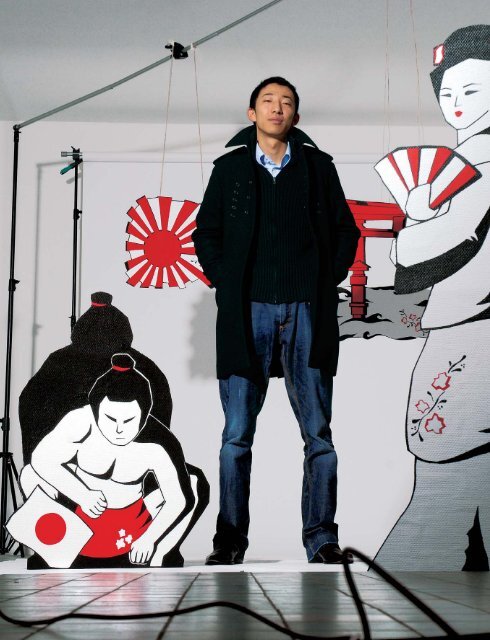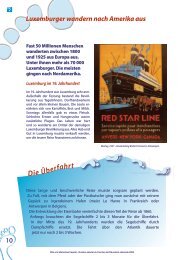08_international community.qxd - Ikl
08_international community.qxd - Ikl
08_international community.qxd - Ikl
Create successful ePaper yourself
Turn your PDF publications into a flip-book with our unique Google optimized e-Paper software.
International Community162 nationalities live in Luxembourg,including 360 Japanese.162 nationalités cohabitent à Luxembourg,dont 360 Japonais.Bridgingthe CulturalDivideThe son of a successful entrepreneur who brought the firstJapanese restaurant to the Grand Duchy – Taku Miyamaehas been raised in the Occidental but keeps his sights setclearly on the Asian.Taku Miyamae, living between two culturesTaku Miyamae, entre deux culturesPhotos: Andres Lejona / Conception de l’espace: Pascale MichalskiTaku Miyamae is a young man livingbetween two diverse cultures – theJapanese one of his heritage and theLuxembourg <strong>community</strong> where he has livedsince his mother brought him over as a baby tojoin his father Hajime 20 years ago.Bridging the gap between the cultures hasnot always been easy. There were few Japanesefriends. Learning the predominate languages ofLuxembourg as well as his native Japanese wasalso confusing at times. “My head was like amilkshake with all these different languages –like in a bucket – shaking around!” This processwas helped in part by the local Japanese association,which provided some language assistance.Even so, Taku remembers “havingstomach pains” on the way to his Luxembourgishschool every day.Taku’s parents also experienced a challengingtransition. His father, Hajime Miyamae,was the first in his own family to leave Japan topursue a university education in Europe. “Itwas the dream of most young Japanese to traveloverseas,” says Hajime. Knowing only a fewsurvival words in French, he arrived in Paris tostudy French and Economics. It was here thatHajime met his first Luxembourgish friends –contacts who would later prove invaluable tohis career.Following graduation, Hajime married hislong-time sweetheart Akemi (who stayed 39
RiskManagementChizu Takenaka is petite and soft-spoken –with a fierce, independent spirit that maynot be obvious upon first meeting.A native of Fukuoka, Japan, Chizu’s familywas strictly traditional where “the fatheralways decides what’s best.” Even so,Chizu challenged herself from a young ageto follow her own path. Whether climbingto the height of the “tower” in divingcompetitions at the Junior Olympics orpersuading her parents at 16 to let herenrol in a student exchange programme inCalifornia – Chizu has never been satisfiedwith the familiar or the safe.Following graduation, she was theyoungest employee to be hired at ParabasBank in Tokyo. Though her career continuedsuccessfully in Japan, Chizu was againready for a new challenge. She was curiousabout a place her colleagues had mentioned,and although she had no contactsin Luxembourg, Chizu accepted a positionwith the Bank of Tokyo-Mitsubishi. Thatwas six years ago. Her current title? “VicePresident, Risk Management.” It is somethingshe knows well. DFAGestiondes risquesChizu Takenaka, femme menue et à la voixdouce, manifeste un farouche espritd’indépendance qui n’est pas forcémentévident à première vue. Née à Fukuoka, auJapon, Chizu a grandi dans une famille strictementtraditionnelle, où «c’est toujoursle père qui décide de ce qui est mieux».Et pourtant, Chizu s’est très tôt fixé pourobjectif de suivre sa propre voie. Qu’ils’agisse de grimper tout en haut de la«tour» lors de la compétition de plongeonaux Jeux olympiques juniors ou, à 16 ans,de persuader ses parents de la laisser s’inscrireà un programme d’échange étudianten Californie, Chizu ne s’est jamais satisfaitede la routine ou de la sécurité.Après son diplôme, elle a été la plus jeuneemployée de la Parabas Bank de Tokyo.Malgré une brillante carrière au Japon,Chizu a eu envie de relever un nouveaudéfi. Sa curiosité ayant été attisée par unposte que ses collègues avaient évoqué et,bien que n’ayant aucun contact àLuxembourg, elle a accepté un emploi à labanque de Tokyo-Mitsubishi. C’était il y asix ans. Ses responsabilités actuelles? «Viceprésidente,gestion des risques». Un domainequ’elle connaît bien…Chizu Takenaka, an independent spiritChizu Takenaka, un esprit indépendant in Tokyo) and then spent years working inthe import-export business. Taku recounts thathis father’s constant travelling in Africa andEurope soon became stressful: “Especially afterI was born!”Kamakura anda New DirectionEncouraged by his Luxembourgish friendsand ready for a new challenge, HajimeMiyamae’s idea for the first gastronomicJapanese restaurant in Luxembourg took shape.At a time when most locals viewed all Asianfood as essentially the same, Hajime’s goal wasto introduce not just the cuisine of Japan, butthe Japanese culture as well. Says Taku: “Myfather had to open their minds and lead them toa new way of thinking and experiencing... toknow that our culture is more than just wearingkimonos and eating on the floor.”Although “Kamakura” takes its name from aplace signifying peace of mind and spirit – thereality of the first few years in Luxembourgrequired patience and more than a littlenudging of its clientele. Chopsticks for forks? Nospoon for the soup? At each baffled enquiry,Hajime would smoothly intervene. If localknowledge of Japanese culture and cuisine waswanting in Luxembourg in 1988, food becamean excellent means to educate and integrate the“New Japan” into Old World culture. It tookabout three years.“My father became a teacher in a way,” saysTaku proudly. “He would go to each table at therestaurant and explain the different dishes andhow they were prepared.” As Kamakura’s popularitygrew, so did the mix of nationalitiesaround its tables. “Now my family takes greatpleasure in seeing regular clients bring in theirown friends and share their enthusiasm for thedishes.”Taku has learned much about the familybusiness in Luxembourg. At this point inhis life, he also sees his position between thetwo divides – Occidental and Oriental – in apositive light. “I got a lot of different culturalmessages growing up. But now, it is an advantage.I feel that I can actually understand bothcultures.”Like his parents, Taku has learned to appreciatethe “contacts and good relations” that a successfulbusiness requires. “It is always anadvantage I think.” Not surprisingly, he is studyingbusiness management at university in Trier.Eye to the EastBut Taku’s sights are still set on his Japaneseroots, where he would like to return one day tocontinue his studies. “I haven’t had the opportunityto know my own country. I want to reallyexperience it – the daily life of a Japanese inJapan.” As for his Japanese language skills? “Ican read and speak Japanese fluently – but writingthe 2,000 symbols is something different!”At Kamakura, it will be another busy night.Hajime, Akemi and their staff are politely greetingthe first arrivals. The menu has both traditionaland seasonal specialities. Taku explainsthat some Japanese dishes date back to the sixthcentury. Sushi, by contrast, is relatively “new”,appearing some 250 years ago. To ensure freshness,fish is “transported live until it goes on theplate.” And his favourite dishes amongst thepopular choices of Sukiyaki, Sashimi, Tempuraand the like? Taku laughs, “Actually I like Italianfood.” Deborah Fulton Anderson40
Kozuhito “Kazu” Kitayama, total transitionKozuhito «Kazu» Kitayama, transition totaleFindingHarmony“I will never forget my first journey herefrom Tokyo. I had one suitcase and fiveboxes of Japanese engineering books!”That was in 1971. Today, Kozuhito “Kazu”Kitayama has more than bridged the culturaldivide – he has made the total transition.His Luxembourgish wife Annetteconfirms, “He speaks like a local. Everyonethinks he was born here.” What wasmeant to be a one-year stint has evolvedinto a permanent home base in theGrand- Duchy. Kazu is a key managerwith Goodyear in Auto EngineeringCoordination. He does keep someJapanese connections alive: he hascoached judo with the local Luxembourgclub and has a passion for Japanesenoodles – he enthusiastically explainsthe preparation of his favourite dishes,which he has now taught to Annette.The cuisine seems to be all that Kazumisses of Japan. He has found, as he says,“harmony and a spirit of independence”in Luxembourg – far removed from“typical responsibilities” had he stayedin Tokyo. Kazu appears to be mostcontent with his choice. DFATrouverl’harmonie«Je n’oublierai jamais la première fois queje suis arrivé ici. Je venais de Tokyo et j’avaisune valise et cinq cartons de livres techniquesen japonais!» C’était en 1971.Aujourd’hui, Kozuhito «Kazu» Kitayama a bienplus que fait le lien entre les deux cultures,il a complètement achevé la transition.Comme le confirme sa femme Annette,Luxembourgeoise, «il parle comme quelqu’undu coin. Tout le monde croit qu’il est d’ici».À l’origine, prévu pour n’être qu’une expérienced’une année, le Grand-Duché est devenuson port d’attache permanent. Kazu est leprincipal manager de la coordination de l’ingénierieautomobile au sein de Goodyear. Ilgarde certains contacts avec la culture japonaise:il a enseigné le judo au club local deLuxembourg et se passionne pour les nouillesjaponaises. C’est avec grand enthousiasmequ’il explique la préparation de ses plats préférés,qu’il a entre-temps apprise à Annette.Kazu ne semble regretter du Japon que lacuisine. Il a trouvé à Luxembourg, selon sespropres dires, «une harmonie et un espritd’indépendance» très loin des «responsabilitéstypiques» qu’il aurait dû assumer s’il étaitresté à Tokyo. Kazu paraît très heureux deson choix.Faire le lien entredeux cultures différentesTaku Miyamae a grandi entre deux culturesdifférentes, la culture japonaise,qui fait partie de son patrimoine, et celle dela communauté du Luxembourg où il a vécudepuis que sa mère l’y a emmené rejoindreson père, il y a vingt ans de cela, quand ilétait tout petit encore.Établir un lien entre ces deux cultures n’apas toujours été facile. Il s’est trouvé peud’amis japonais au Grand-Duché. Apprendreles principales langues parlées au Luxembourgen même temps que sa langue maternelleétait un peu déroutant par moments.«Ma tête était comme un milk shake, avectoutes ces langues différentes qui se mélangeaientà l’intérieur!»Nouveau modede penséeSes parents ont également eu à relever ledéfi de la transition entre les deux cultures.Son père, Hajime Miyamae, a été le premierde la famille à quitter le Japon. «C’était le rêvede la plupart des jeunes Japonais de voyager àl’étranger», raconte Hajime, qui ne savait quequelques rudiments de français lorsqu’il estarrivé à Paris pour y apprendre le français etles sciences économiques. C’est à Paris qu’il arencontré ses premiers amis luxembourgeois,des contacts qui se sont par la suite révélésinestimables lorsqu’il a pris la décision d’ouvrir,au Grand-Duché, le premier restaurantjaponais gastronomique.En 1988, pour la plupart des Luxembourgeois,il n’existait qu’un seul type de cuisineasiatique. Le but de Hajime était d’introduirenon seulement la cuisine, mais aussi la culturejaponaise. Comme le dit Taku: «Mon père a dûleur ouvrir l’esprit et les amener à un nouveaumode de pensée et de perception... pour qu’ilscomprennent que notre culture ne se limite passeulement au port du kimono et au fait demanger par terre».Hajime a choisi le nom de «Kamakura»pour son restaurant, d’après un endroit représentantla paix et la tranquillité de l’esprit.Pourtant, dans les faits, il lui a fallu faire preuvede beaucoup de patience au cours de ses premièresannées au Luxembourg. «Des baguettes?Pas de fourchettes? Et pour la soupe pasde cuillère?». À chaque demande d’explication,Hajime intervenait avec douceur. «Mon pèreest en quelque sorte devenu un professeur»,déclare avec fierté Taku. «Il allait à chaquetable pour expliquer les différents plats et leurmode de préparation».Comprendreles deux culturesTaku a beaucoup appris sur l’entreprisefamiliale à Luxembourg. Il est maintenantarrivé à un moment de sa vie où il voit sa positionentre les deux mondes, l’occidental etl’oriental, sous un jour positif. «J’ai grandi enrecevant un grand nombre de messages culturelsdifférents. Mais je vois aujourd’hui quecela a joué en ma faveur. J’ai le sentiment depouvoir en fait comprendre les deux cultures».41
Dancing alongThe CulturalDivideYuko Kominami is a creative movementartist and teacher who brings her ownstyle of contemporary expression to theGrand- Duchy. While a student of Japanesehistory in Tokyo, she discovered the richinfluence of ritual dance on her nativeculture. She now concentrates on Butoh,a type of dance that mixes Japaneseand European styles along with intensetheatrical improvisation.Her own bridge to Luxembourg startedin London, where she was studyingat the Lavan Center of ContemporaryDance. There she met her future husband,a Luxembourger, who was pursuing a master’sin history. Today, Yuko describes heradopted culture as an artist might: “Youhave this fortress that frames the city,with so many languages being spokeninside. There is the visible and the invisible– lots of complex layers here. It is intriguing.”Yuko wants to study moreLuxembourgish to assist her in her localwork with special needs adults, as well asfuture projects integrating the “inevitableenergy” of Butoh dance. DFADanserla différenceculturelleYuko Kominami, artiste du mouvement et professeurà l’esprit novateur, apporte au Grand-Duché un style d’expression contemporainebien à elle. Après avoir découvert, lors de sesétudes d’histoire du Japon à Tokyo, la richeinfluence de la danse rituelle sur la culture deson pays, elle se concentre maintenant sur leButô, un type de danse qui, mêlant style japonaiset style européen, laisse en même tempsune grande place à l’improvisation théâtrale.C’est à Londres qu’elle a emprunté la passerellequi l’a conduite à Luxembourg, alorsqu’elle étudiait au centre de danse contemporaineLavan, où elle a rencontré son futur mari,un Luxembourgeois qui préparait alors unemaîtrise d’histoire. Yuko décrit aujourd’hui saculture adoptive comme le ferait une artiste:«Il y a cette forteresse qui entoure la ville,avec toutes ces langues qu’on y parle. On ytrouve le visible et l’invisible, de nombreuseset complexes couches se superposent ici. C’estfascinant».Yuko voudrait étudier plus avant leluxembourgeois pour progresser dans son travailavec des adultes ayant des besoins spécifiquesainsi que dans ses futurs projets quiintégreront «l’inévitable énergie» du Butô.Yuko Kominami, Butoh dancerYuko Kominami, danseuse de ButôJapan FactsFOR MORE INFORMATION:Ambassade du JaponHE Mr Kauhito Tatebe,Ambassador of Japan to Luxembourg62, av. de la Faïencerie, L-1510 LuxembourgTel 46 41 51-1, Fax 46 41 76embjapan@pt.luwww.lu.emb-japan.go.jpEspace Culturel de l’Ambassade du JaponTravel and cultural information62, av. de la Faïencerie, L-2010 LuxembourgTel 46 41 51-51(10-12h)JAPAN IN LUXEMBOURG:Un Voyage Musical Japan-EuropeRecital of music (Soprano, Piano, Violin)07.02.07 , 20h, Auditorium de la Banquede Luxembourg, Res 46 41 51-1Yuko Kominami Dance and MovementCourses in dance and creative movementyukokominami@hotmail.comWHERE JAPANESE MEET IN LUXEMBOURG:Kamakura Restaurant4, rue Munster, L-2160 LuxembourgTel 47 06 04, Fax 46 73 30, kamakura@pt.luYamayu Santatsu26, rue Notre Dame, L-2240, LuxembourgTel 46 12 49WHERE JAPANESE WORK IN LUXEMBOURG:Banks, Goodyear SA,DuPont Teijin Films, RestaurantsABOUT JAPAN:Population: 07/2006: 127,463,611Capital: Tokyo (30 million residents)Topography: Over 3,000 islandsin the Pacific OceanNational Holiday:National Foundation Day, 11 FebruaryBirthday of Emperor Akihito, 23 DecemberPredominate Religions: Shinto and BuddhismGOVERNMENT:Type: Constitutional monarchywith a parliamentary governmentConstitution adopted: May 3, 1947Chief of State: Emperor AkihitoHead of Government:Prime Minister Shinzo AbeFINANCIAL:Tokyo Stock Exchange: second largest in theworldMitsubishi UFJ Financial Group:world’s largest bankJapan Post: largest holder of personal savings(approx. 3 trillion US dollars)HOW DO YOU SAY?Hello! Konnichiwa!Goodbye! Sayounara!Thank you! Arigatou gozaimasuYes/No Hai/IieOh, I see! As, soo desu ka!FAMOUS JAPANESE:Yasunari Kawabata, Nobel Prize winning novelistDr Yoshiro Nakamatsu, aka Dr NakaMats,inventor (compact disc, digital watch)Dr Osamu Tezuka,originator of story-based manga (comic magazines)Akira Kurosawa,film director, producer, screenwriterTakeshi Kitano,aka Beat Takeshi, comedian, director, authorYoko Ono Lennon, musician and artistToru Takemitsu, composerSakichi Toyoda, founder of Toyota IndustriesMasaru Ibuka and Akio Morita, founders of SonyCorporation42








